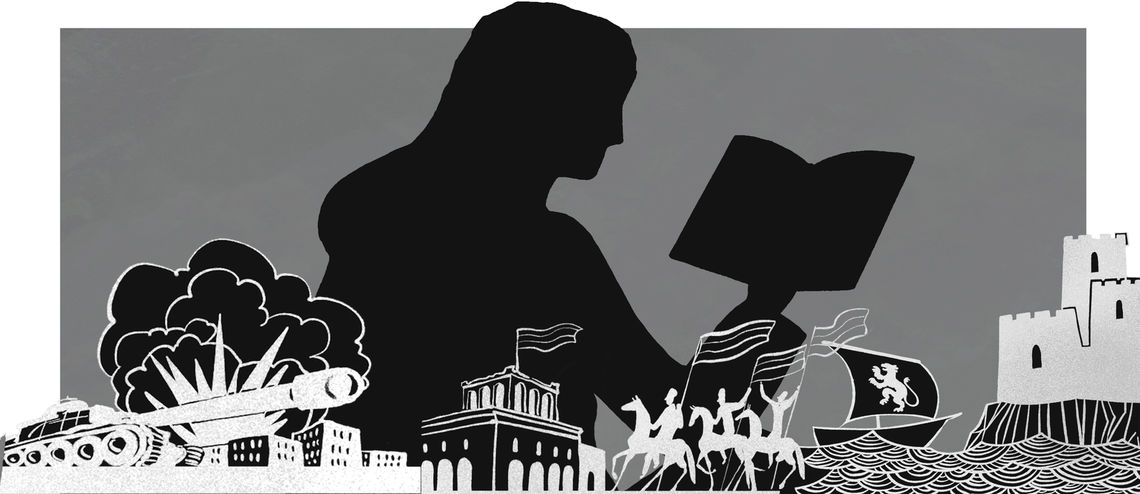
The past never leaves us. It casts its shadow, influences our thoughts, opinions, decisions and actions. We recall different episodes and to varying degrees, the victories, failures, joyful moments and misfortunes. Sometimes the important is forgotten and the insignificant accompanies us throughout our lives. After all, the past makes us who we are.
Why Study History
The simplest and most common answers are the following: “We must learn from the past and not repeat mistakes” or “We must know the past to understand what awaits us in the future.”
I don’t believe in such simple solutions and treat these claims with reservation.
I believe that history never repeats itself. There may be comparable situations, similarities in our notions and interpretations of it, but its repetition is impossible and drawing conclusions thereby futile. On the other hand, certainly, the logical development of the past can provide hints because the inertia of history is extremely significant, which the present is often conditioned by. However, in this case, history also offers us a number of schemes for development; it is extremely difficult to predict which of them could become a reality.
History first and foremost studies the person. According to historian Marc Bloch, history is the science of people in a given period of time. And just as it is possible to understand the present through the past, many events of the past can be understood through the present. Let’s agree on how much historical events have recently become more understandable to us, through our own lived experience.
History and Armenian Identity
History and historical memory transform an ethnic group into a nation. According to French philosopher and historian Ernest Renan, “A nation is the sum of certain values and pride in its historical past.” Historical memory gives people a sense of belonging to a national group. And Armenian history can be unconditionally classified as a component of Armenian identity together with the Armenian language, the Armenian Apostolic Church, Armenian culture and the Armenians’ homeland, the Armenian Highland. History, in general, from the myth of being born of Hayk to the restoration of Armenian statehood and the Artsakh wars have shaped the Armenian people.
We Armenians are very attached to history. And that is natural. We have one of the oldest schools of historiography, which starts with Movses Khorenatsi, Faustus the Byzantine and Yeghishe and emerging from the depth of centuries creates a tradition of history that is interconnected not only with our culture and political thought but also with our daily lives.
From Tigran the Great to the Armenian Genocide, different historical topics are constantly discussed by various circles of our society. The political elite constantly and actively uses it to consolidate its own vision and legitimacy and to unite society around itself, by imparting desirable messages and also promoting certain heroes and historical events and forgetting others. On the other hand, the political process sometimes falls victim to existing notions of the past.
Cultural figures often find their source of inspiration in history, while ordinary citizens are proud of victories, trying to find their own share of fame in them.
We try to find parallels, search for solutions in the events of the past, we mourn our mistakes, and are proud of our victories. Our history is our pride, sometimes our shame and always our secret. How did the Armenian elite make decisions that were transformative for us when adopting Christianity in 301 A.D. as the state religion and creating our alphabet in 405 A.D.? How did the migrants in Cilicia not only unite the Armenian community, but also re-establish Armenian statehood to become one of the most powerful trading centers in the world? Why, for centuries, from 1045, or after the fall of Cilicia from 1375 to 1918, in the absence of statehood, did we not disappear from the historical stage? Why did Kars fall and the First Armenian Republic collapse? What did the experience of Soviet Armenia give us?
Perhaps it is these questions and the search for their answers that may be the secret to endurance, thanks to which we survived and made it to the 21st century albeit brimming with losses, unspeakable casualties, suffering, but with the ability and determination to look to the future.
We have never before lived feeling historical events this close to us and understanding them intrinsically. History is by our side.

